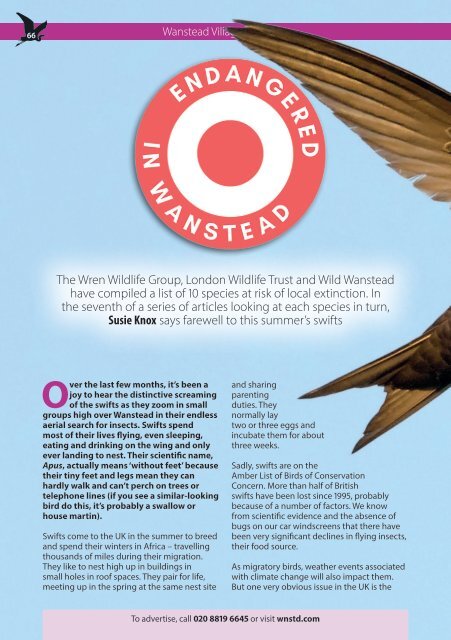September 2021
You also want an ePaper? Increase the reach of your titles
YUMPU automatically turns print PDFs into web optimized ePapers that Google loves.
66<br />
Wanstead Village Directory<br />
The Wren Wildlife Group, London Wildlife Trust and Wild Wanstead<br />
have compiled a list of 10 species at risk of local extinction. In<br />
the seventh of a series of articles looking at each species in turn,<br />
Susie Knox says farewell to this summer’s swifts<br />
Over the last few months, it’s been a<br />
joy to hear the distinctive screaming<br />
of the swifts as they zoom in small<br />
groups high over Wanstead in their endless<br />
aerial search for insects. Swifts spend<br />
most of their lives flying, even sleeping,<br />
eating and drinking on the wing and only<br />
ever landing to nest. Their scientific name,<br />
Apus, actually means ‘without feet’ because<br />
their tiny feet and legs mean they can<br />
hardly walk and can’t perch on trees or<br />
telephone lines (if you see a similar-looking<br />
bird do this, it’s probably a swallow or<br />
house martin).<br />
Swifts come to the UK in the summer to breed<br />
and spend their winters in Africa – travelling<br />
thousands of miles during their migration.<br />
They like to nest high up in buildings in<br />
small holes in roof spaces. They pair for life,<br />
meeting up in the spring at the same nest site<br />
and sharing<br />
parenting<br />
duties. They<br />
normally lay<br />
two or three eggs and<br />
incubate them for about<br />
three weeks.<br />
Sadly, swifts are on the<br />
Amber List of Birds of Conservation<br />
Concern. More than half of British<br />
swifts have been lost since 1995, probably<br />
because of a number of factors. We know<br />
from scientific evidence and the absence of<br />
bugs on our car windscreens that there have<br />
been very significant declines in flying insects,<br />
their food source.<br />
As migratory birds, weather events associated<br />
with climate change will also impact them.<br />
But one very obvious issue in the UK is the<br />
To advertise, call 020 8819 6645 or visit wnstd.com

















